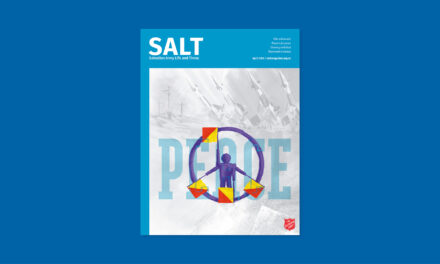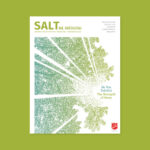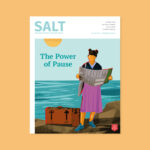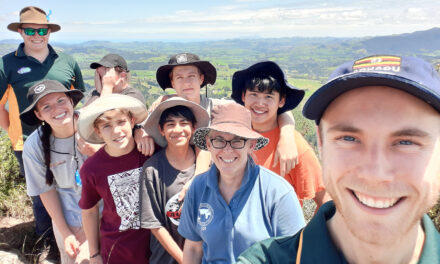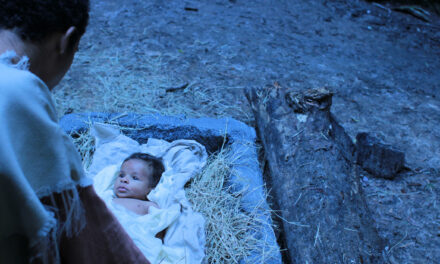
Defining Moment for Māori Ministry

A te Whakatau me te Whakanui (ceremony) was held in Pollard Hall at Territorial Headquarters on April 18 to welcome Bishop Te Kitohi Pikaahu as the new chair of The Salvation Army’s refreshed national Māori Ministry Rūnanga. Jules Badger reports.
Photo (from left): Deputy Police Commisioner Wallace Haumaha, Commissioner Mark Campbell, The Right Reverend Te Kitohi Pikaahu, Rangi McLean, Nate Houpapa (kaikarakia/kaikōrero Te Atiawa/Ngāti Porou) and Commissioner Julie Campbell.
The Right Reverend Te Kitohi Pikaahu (Ngāpuhi, Ngāti Kahu, Te Rarawa and Te Roroa) is the Anglican Bishop of Te Tai Tokerau (Northland and Auckland). Bishop Pikaahu was awarded the New Zealand Order of Merit for services to the Anglican Church and Māori in 2021, and is renowned as one of the highest-ranking and longest-serving indigenous advocates worldwide. The bishop’s acceptance of the role as chair of the Rūnunga is a huge honour for The Salvation Army, and the benefits of his influence are already being felt.
Already in our hearts
While the welcome ceremony signalled the official welcome of the bishop as the new chair, Commissioner Mark Campbell, territorial leader, was careful to explain and acknowledge that the relationship is not new. ‘In context, you’ve been in the room for some time—you’ve been part of The Salvation Army family helping us along the journey to get to where we are today. We want to say thank you but also thank God for you. Today we say an official welcome, but you have certainly been in our hearts for some time now.’
Mark referred to the ceremony as a ‘defining moment’ in The Salvation Army’s journey towards ensuring all people—particularly our Māori community—flourish. ‘This is a significant step forward,’ said Mark, ‘and I want to thank all that have been involved in leadership in the past, and commit to God the future under our He Waka Eke Noa strategic framework—all of us together as an Army that brings life, the life of Jesus Christ.’
Mark also acknowledged the bishop’s work in speaking into terms of reference for discussion and reconciliation in recent times.
‘I want to say thank you on behalf of Julie and I as leaders here. And even though we look after Fiji, Tonga and Samoa, today is all about Aotearoa New Zealand,’ he said.
Shared authority
‘The transition of The Salvation Army Māori Ministry Rūnanga to one based on a covenantal relationship/partnership with the Territorial Governance Board represents a hugely positive step in the Army’s journey of mission with and for Māori,’ explained Lt-Colonel Ian Hutson. ‘It includes looking to implement the promises of Te Tiriti o Waitangi, and the shared strategic priorities of The Salvation Army. The idea of committing to a relationship between these two groups and the wider Army—before God—as the basis of how the Army operates is hugely inspiring. To have someone of Bishop Pikaahu’s stature providing leadership augurs well for something special in the future.’
Reminding us of the history we share, the bishop said, ‘None of our tipuna who signed the Treaty of Waitangi ever envisaged that their descendants would be impoverished. They assumed that their descendants would flourish and thrive, and they believed the Treaty would reinforce this. Henry Williams and the church wrote the Treaty to guard against the New Zealand Company taking
all the whenua.’
And so, the opportunity for The Salvation Army to not just work with Māori, but ensure that shared authority exists within the one structure is underway. The bishop affirms that this is key to the next phase. ‘The recognition of Māori Ministry and the composition of the members of the Rūnanga brings us closer to the fulfilment of the vision that The Salvation Army as an organisation has articulated. I would not have agreed to be chair if I didn’t believe the board had conceived of the vision. I believe in faith and hope that this is the beginning of that next phase.’
A step forward for Māori
Envoy Anihera Carroll, Pou Arahi (Māori Cultural Advisor, Booth College of Mission), is excited about Bishop Kitohi becoming the Rūnunga chair for the next season. Describing the journey to this point as ‘littered with frustration and misunderstanding, as well as stops and starts,’ she believes the tide has turned. ‘We now have a gentleman who has journeyed with us throughout the recent reconciliation process and who understands who we are, but first and foremost is a man of God passionate about spreading the love of Jesus and bringing people together.’
Captain Hana Seddon, Rotorua Corps, said, ‘I’m really blessed by The Salvation Army’s willingness to bring previous pain out for discussion rather than sweeping those moments—current or historic—under the carpet. The appointment of the bishop to chair the Rūnunga is an action … every action now just moves us to a better place so we can really own that name Te Ope Whakaora—The Army that Brings Life—for Māori.’
For Major Christine De Maine, Māori Ministry Southern Division, the appointment of the bishop is especially poignant. ‘I hold Bishop Pikaahu in high esteem because we are whanaunga (related). I sit with my tipuna (ancestors) and whānau (family) having rediscovered this beautiful connection, and I’m so proud to be part of the ongoing story and able to point out how far we’ve come. We carry all of our tipuna with us as well as all of that hurt and pain—all that we’ve engaged with as Te Ope Whakaora—we bring all of that and take another step forward for Māori. The fact that this is happening during our movement’s 140-year celebrations—that we come into this new season with freshness and a new person as chair of the Rūnanga—is so significant.’


